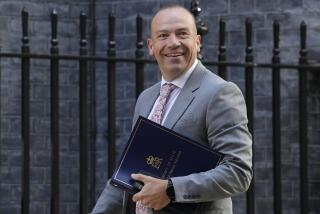Blair Vows to Curb N. Ireland Violence
- Share via
LONDON — Britain declined to impose sanctions on any of the paramilitary armies in Northern Ireland or their affiliated political parties Wednesday, but it warned that it would establish “more rigorous” measures to prevent violence.
“It is no longer sufficient just that there should be no terrorist violence,” Prime Minister Tony Blair told the lower house of Parliament, the Commons. “We have to be clear that the preparation of violence has also ceased.”
Paramilitary members are under stepped-up surveillance, 250 more police officers are on duty in Northern Ireland’s capital, Belfast, and the law is being studied to see whether new arrest powers can be given to security forces in response to violence, said John Reid, Britain’s Northern Ireland secretary.
He also said all parties in the 108-member Northern Ireland Assembly have been asked to reaffirm their “total commitment” to peace.
Pro-British unionists and pro-independence republicans in the British province have accused paramilitary groups on the opposite side of fomenting violent demonstrations in Belfast this summer.
Each side has called on Blair to invoke sanctions against the other.
When Blair’s government declined to do so Wednesday, unionists and republicans both expressed disappointment. But neither side pulled out of the province’s power-sharing Assembly.
That means the peace process begun by the 1998 Good Friday agreement can continue. Under that pact, the armed paramilitary groups affiliated with parties that signed it are required to maintain a cease-fire. If any sectarian group violates the truce, the prescribed sanction is a sort of political death penalty: The group’s affiliated political party is to lose its seats in the Assembly.
Although police in Northern Ireland have reported acts of violence by republican and unionist paramilitary members, Blair has never invoked that sanction. To ban any party from the Assembly could well lead to a collapse of the local government, and the peace process with it.
The warning of tougher measures didn’t seem to deter extremist violence. A bombing Wednesday claimed by Irish Republican Army dissidents damaged the home of pro-unionist House of Lords member Lord Brookeborough, grandson of a former Protestant prime minister of Northern Ireland, and suspected IRA dissidents tried but failed to hijack the main Dublin-to-Belfast train.
More to Read
Sign up for Essential California
The most important California stories and recommendations in your inbox every morning.
You may occasionally receive promotional content from the Los Angeles Times.










